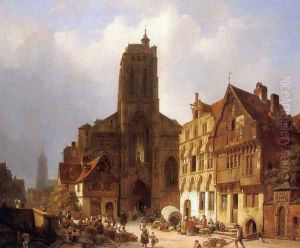Ambrose Vermerrsch Paintings
Ambrose Vermerrsch was a Belgian poet and revolutionary figure born in 1820 in Bruges. His life was marked by his passionate involvement in political and social movements of his time, particularly the revolutionary upheavals that swept through Europe in the mid-19th century. From a young age, Vermerrsch was engaged in the world of literature and politics, which were often intertwined in the period's intellectual circles.
In the early 1840s, Vermerrsch moved to Paris, which was a hub for many artists and intellectuals seeking to exchange ideas and promote social change. There, he became associated with radical groups and was influenced by the revolutionary ideologies that were gaining momentum. His poetry often reflected his political convictions, and he used his writing as a means to advocate for social justice and to challenge the established order.
Vermerrsch's involvement in revolutionary activities eventually led to his imprisonment. The harsh realities of political struggle, combined with personal hardships, influenced his poetic works, which were characterized by a fervent and sometimes militant tone. Despite his struggles, he continued to write and remained committed to his ideals throughout his life.
Ambrose Vermerrsch's contributions to literature and his role in the revolutionary movements of the 19th century were significant, though he is not as widely known today as some of his contemporaries. He died in 1874, leaving behind a legacy as a poet of the people and a fighter for a more equitable society. His works continue to be studied by those interested in the intersection of art and political activism during a period of great change in European history.
